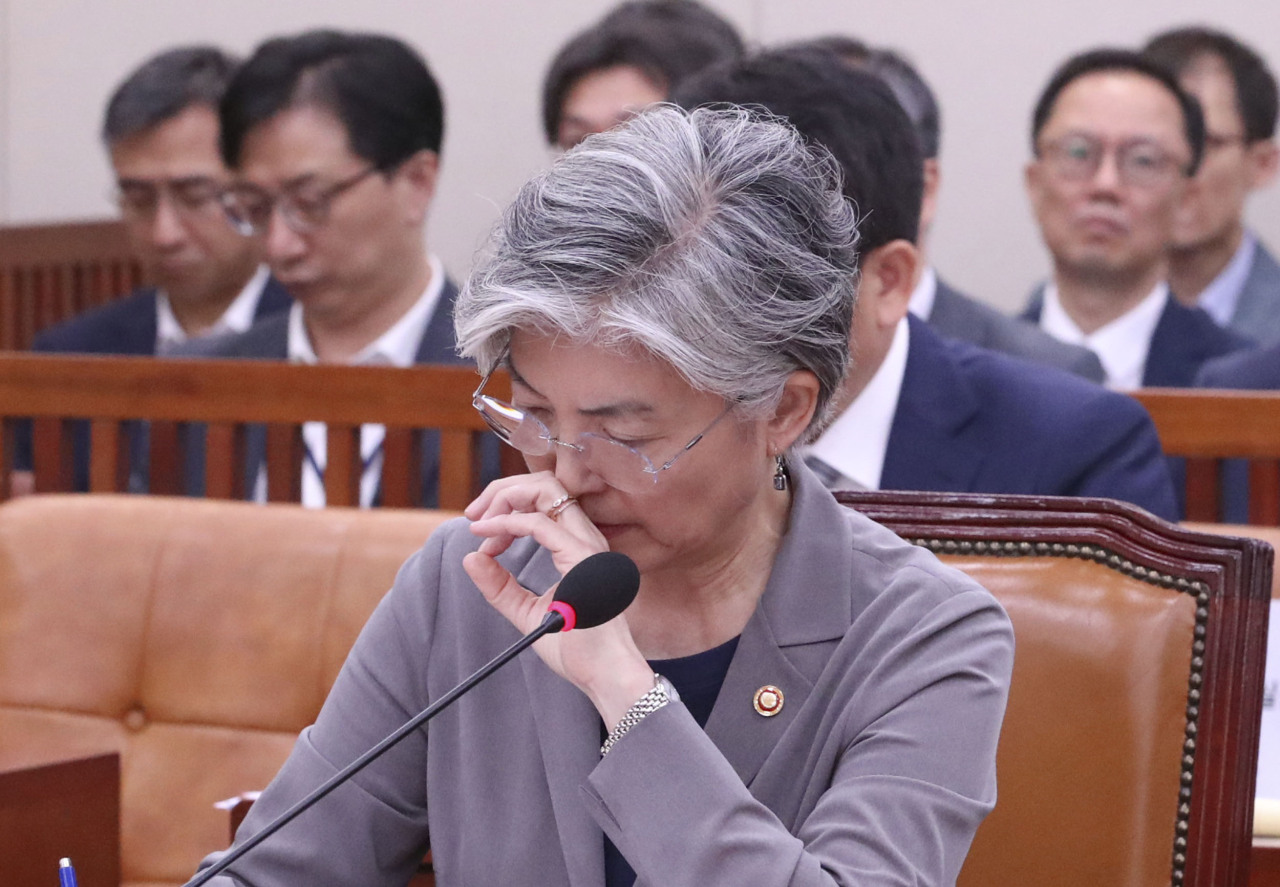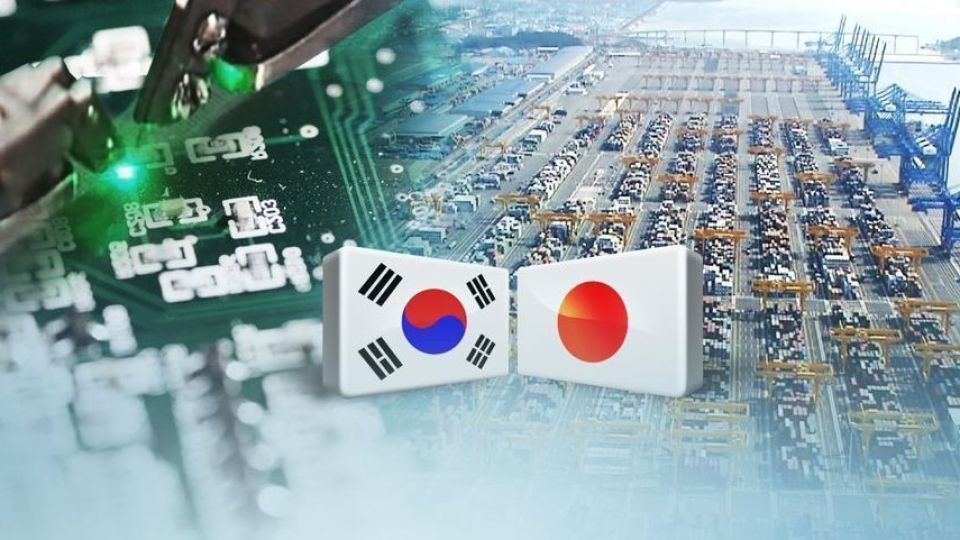July 31, 2019
A deadline looms for Japan to remove export ban.
The conflict between South Korea and Japan over trade and historical issues is likely to intensify in the coming days, but prospects of a diplomatic solution remain unclear.
Foreign Affairs Minister Kang Kyung-wha said in a Cabinet meeting Friday that there is “significant” possibility of Japan removing Korea from its whitelist of trade partners.
 |
Such a move will result in Japanese firms requiring government approval for individual shipments to Korea of most materials and products with the exception of food stuff and timber.
The potential move comes on the heels of Japan’s decision to curb exports of key semiconductor-related materials to Korea early this month. Tokyo has cited a number of reasons for the move, but Seoul has interpreted it as a retribution for the Supreme Court’s order siding with those forced into working for Japanese firms during Japan’s occupation of Korea.
Speaking at the National Assembly on Tuesday, Kang also outlined the government’s plans for responding to the situation.
“The outreach (efforts) to the international community will be maintained, and our rejoinder to Japan’s measures will be drawn up under the pan-government response system,” Kang said, reiterating that the ministry will keep urging Japan to refrain from excluding Korea from the whitelist.
Kang’s comments came a day ahead of her departure for the ASEAN Regional Forum and a National Assembly delegation’s visit to Tokyo.
Kang and her Japanese counterpart Taro Kono are set to arrive in Bangkok on Wednesday and hold a series of bilateral talks on the sidelines of the ARF.
The ARF has often set the stage for Seoul-Tokyo foreign ministers’ meetings and trilateral meetings with the US, but none of the concerned parties have confirmed their plans at this year’s forum.
In related developments, Korean trade officials have been calling for talks with their Japanese counterparts with little success.
According to local news reports citing unnamed government sources, Seoul’s requests for talks have been rejected by Japan.
Meanwhile, a National Assembly delegation — 10-member group with lawmakers from five of the main political parties — is being sent to Tokyo in an attempt to aid Seoul’s attempts to initiate talks with Tokyo.
“The message that a diplomatic resolution is essential must be delivered,” National Assembly Speaker Rep. Moon Hee-sang said at a meeting with the delegation, stressing that the current deadlock will damage both countries.
Any US intervention appears unlikely in the near future. With US President Donald Trump having revealed that he has been requested by President Moon Jae-in to step in, US national security adviser John Bolton’s recent visit to Seoul and Tokyo had raised hopes for US involvement.
However, Bolton is reported to have dedicated much of his meetings with Korean officials to increasing Seoul’s cost-sharing for maintaining US military presence.
The possibility of President Moon and Japanese Prime Minister Shinzo Abe sitting down for talks also appears slim.
According to Japanese media reports citing unnamed government sources, Abe will not hold a summit with Moon without Seoul providing “constructive” solutions.
Conservative Japanese daily Sankei Shimbun on Monday reported that Abe will not meet Moon on the sidelines of multinational events unless there is a change in Seoul’s stance.
The multinational events that are likely to be attended by the two leaders include the UN General Assembly in September, ASEAN+3 summit in October and APEC summit in the following month.
According to the daily, the Japanese government is “waiting for a change of stance in Korea, which unilaterally violated the Korea-Japan claims treaty,” referring to the Treaty on Basic Relations signed in 1965.
Seoul has remained firm on its initial response that the government cannot interfere with the Supreme Court’s rulings, prompting Japan to demand that Seoul answer its calls for a solution.
Japan’s claims have been rejected by the Moon administration, which has suggested alternative ways to settle the issue.
Seoul has proposed the so called 1+1 plan, in which a fund is set up a with equal contribution by South Korean and Japanese companies to compensate the victims whose lawsuits have been concluded. In making the proposal, Seoul suggested that the two countries should discuss possible measures to discuss solutions for future cases. Japan has outright rejected the proposal.
Moon has said that the proposal is only a suggestion, and that his administration is open to dialogue with Japan and that it has never claimed the proposal to be the only solution.
There is also talk of sending special envoys to Japan, with Prime Minister Lee Nak-yon being mentioned as Korea’s representative on numerous occasions. Cheong Wa Dae, however, maintains that while all options are being considered, sending a special envoy for the sake of doing so will not help matters.
Meanwhile, a local news network reported Monday that the two sides have already exchanged special envoys. According to the unconfirmed report, Seoul sent a special delegation including a close associate of the president, and a special delegation from Japan has made a visit in response.
As the situation prolongs, the issue of the General Security of Military Information Agreement (GSOMIA) between the two countries has also been raised.
Most left-wing politicians have backed the idea of canceling the agreement, but Cheong Wa Dae and concerned government bodies are cautious, saying that nothing has been decided yet.
The possibility of GSOMIA not being renewed appears to have hit a nerve in Japan, prompting Chief Cabinet Secretary Yoshihide Suga to hint that Tokyo wants the agreement to be renewed.
“(The agreement) has been automatically renewed each year since it was signed in 2016,” Suga said on Monday.
“For the Japanese government, relations with Korea are in a precarious situation, but (the government) thinks that it is important to continue to cooperate in matters that need cooperation.”


